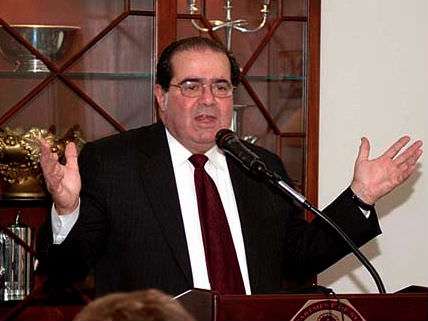Scalia Attacks Obama (and Breyer) for 'Adverse-Possession Theory of Executive Authority' in Recess Appointments Case
Today's Supreme Court decision in National Labor Relations Board v. Noel Canning was a massive defeat for the Obama administration, which lost 9-0 on the question of whether Obama's three purported recess appointments to the NLRB were constitutional. The Court ruled those appointments invalid.

But the defeat could have been far worse. In his majority opinion, Justice Stephen Breyer ruled narrowly against the White House, criticizing the president and his allies for disrespecting the balance of power by claiming the Senate was in recess when the Senate was actually in session. Writing separately, however, Justice Antonin Scalia, joined by Chief Justice John Roberts and Justices Clarence Thomas and Samuel Alito, went much further than that. The Recess Appointments Clause, Scalia argued in his concurring opinion, "cabins" the president's power in two ways. "First, it may be exercised only in 'the Recess of the Senate,' that is, the intermission between two formal legislative sessions. Second," Scalia continued, "it may be used to fill only those vacancies that 'happen during the Recess,' that is, offices that become vacant during that intermission. Both conditions are clear from the Constitution's text and structure, and both were well understood at the founding."
Justice Breyer's majority opinion, by contrast, interpreted the Recess Appointments Clause as allowing both intra-session recess appointments and allowing the appointments of individuals who are filling vacancies that did not originally arise during "the recess" of the Senate. According to Breyer, moreover, Scalia's reading of the Constitution "would render illegitimate thousands of recess appointments reaching all the way back to the founding era."
In response, Scalia charged Breyer with rewriting the Constitution and engaging in a bout of "judicial adventurism." Here is a key portion of Scalia's concurrence:
Today's Court agrees that the appointments were inalid, but for the far narrower reason that they were made during a 3-day break in the Senate's session. On its way to that result, the majority sweeps away the key textual limitations on the recess-appointment power. It holds, first, that the President can make appointments without the Senate's participation even during short breaks in the middle of the Senate's session, and second, that those appointments can fill offices that became vacant long before the break in which they were filled. The majority justifies those atextual results on an adverse-possession theory of executive authority: Presidents have long claimed the powers in question, and the Senate has not disputed those claims with sufficient vigor, so the Court should not "upset the compromises and working arrangements that the elected branches of Government them
selves have reached."
In effect, the real debate in this case boiled down to whether historical practice or constitutional text should be the final controlling authority. Breyer, Kennedy, Ginsburg, Sotomayor, and Kagan went with historical practice. Scalia, Roberts, Thomas, and Alito went with constitutional text. Both sides agreed that Obama did not have a constitutional leg to stand on.


Show Comments (71)